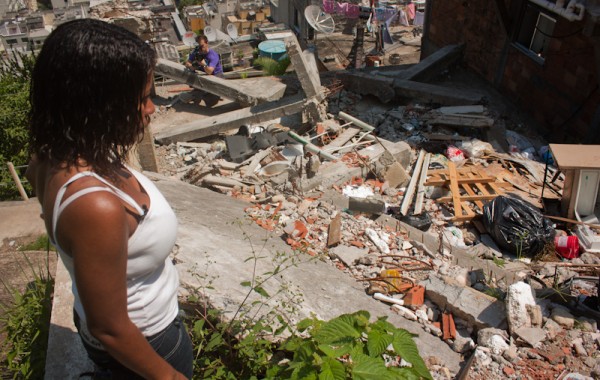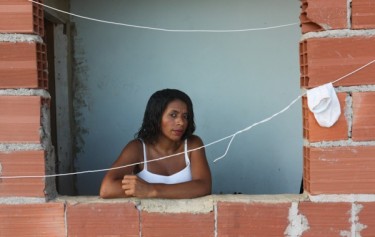This article, by Andrea Dip, is a part of Agência Pública's special #CopaPública [pt] coverage, and was originally published on June 26, 2012, with the title Elisângela Got Home Just in Time to See it Being Torn Down: Watch the Minidoc [pt]
Elisângela wasn't home when authorities arrived without warning to tear down her house on Pavão-Pavãozinho hill in Rio de Janeiro.
Her 17-year-old daughter answered the door and was told that the property was going to be destroyed at that very moment. Panicking, the girl called her mother:
Tem vários homens da Prefeitura aqui na porta; eles estão dizendo que vão derrubar a nossa casa.
There are many men here from the city at the door; they're saying they are going to tear down our house.
Elisângela ran back home, tried to reason with the men, ask for some time to find another home, but it was no use. In a few hours, all that was left was debris. This happened in early 2011. To this day, Elisângela has not been compensated nor relocated. Her daughter had to go live with her grandmother, while Elisângela still searches for a new home.
The minidocumentary “We Are the Legacy: the Story of Elisângela” (“O Legado Somos Nós: A História de Elisângela”) is the first in a series of video portraits being produced by the human rights organization Witness, which partnered with the Rio People's World Cup and Olympics Committee (Comitê Popular Rio Copa e Olimpíadas), in an attempt to tell the stories of those affected by forced evictions in Rio de Janeiro, directly or indirectly connected to the 2014 World Cup and the 2016 Olympics. Priscila Neri, from Witness, explains that the idea is to give an alternative to the official narrative, which claims that everything is being done in compliance with the law and through constant dialogue with the communities.
In Elisângela's particular case, the justification provided at the time of the eviction was that her home was in a risk area in Pavão-Pavãozinho, but only some houses were destroyed and, according to the Rio People's World Cup and Olympics Committee, the city hasn't even removed the debris yet. The hill is located between two of Rio's most sought-after neighborhoods: Ipanema and Copacabana.
According to the dossier [pt] published by the Rio People's World Cup and Olympics Committee, the city intends to use the argument of geotechnical or structural risk to evict more than 300 families from the Pavão-Pavãozinho community:
Até o momento a Prefeitura não apresentou o laudo que comprove o risco e nem discutiu com a comunidade a possibilidade de realização de obras para garantir a segurança dos moradores.
Up until now the city hasn't presented any technical report that backs up the risk claim nor has it discussed with the community the possibility of carrying out infrastructural work to ensure the residents’ safety.
Still according to the Rio People's World Cup and Olympics Committee, engineers that have written technical reports about areas like the Pavão-Pavãozinho have pointed out that doing construction work to restrain or strengthen the slope, in order to eliminate the risk of slippage, would cost even less than relocating the families that live in the area.
Watch the minidoc:








